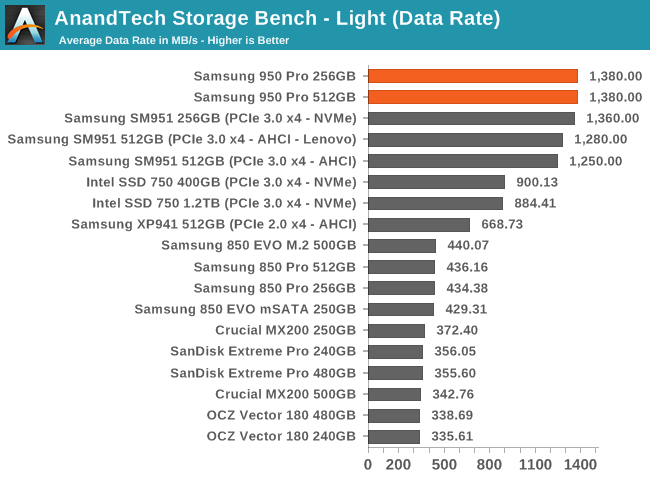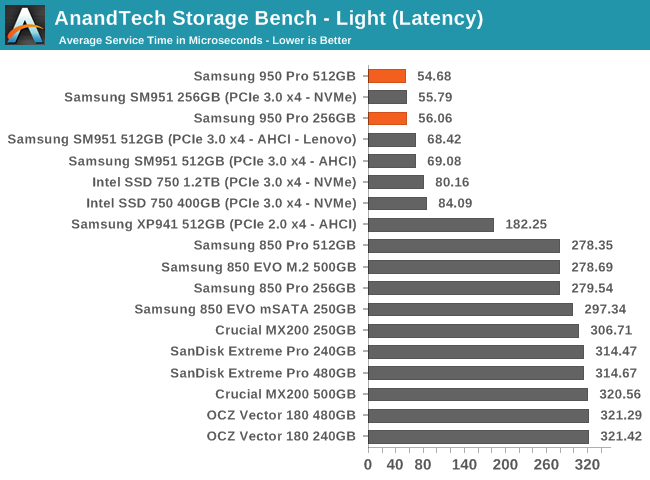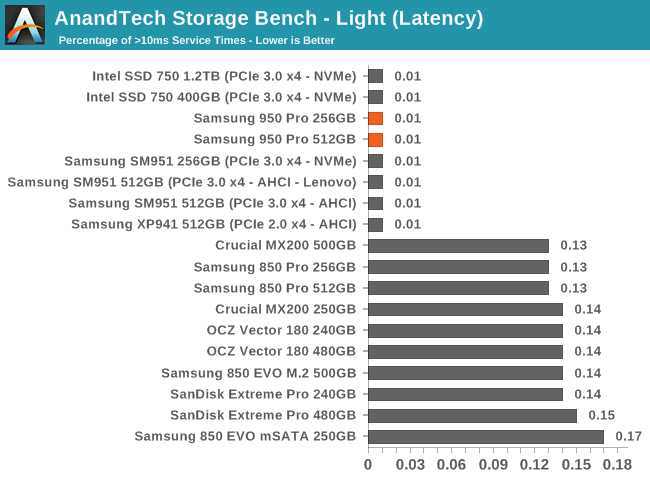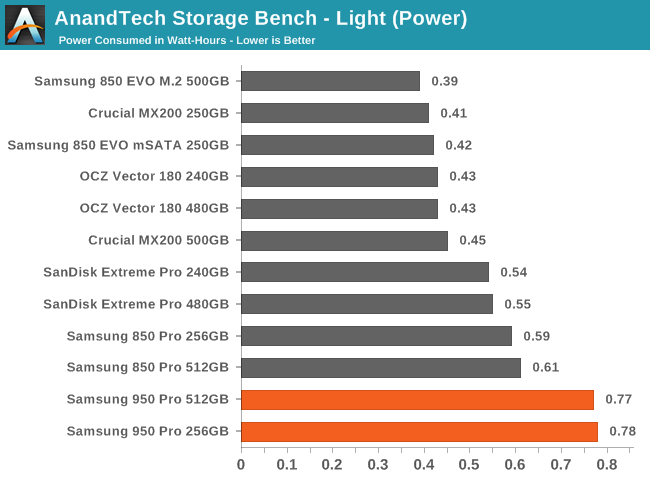The Samsung 950 Pro PCIe SSD Review (256GB and 512GB)
by Billy Tallis on October 22, 2015 10:55 AM ESTAnandTech Storage Bench - Light
Out Light storage test has relatively more sequential accesses and lower queue depths than The Destroyer or the Heavy test, and it's by far the shortest test overall. It's based largely on applications that aren't highly dependent on storage performance, so application launch times and file load times are what dominate this test. Details of the Light test can be found here.

The Light test starts to show a distinct advantage for NVMe, and the Samsung UBX controller is performing much better than Intel's SSD 750.

The three Samsung NVMe drives have the lowest average service time and the SATA drives are all looking quite slow by comparison.

The PCIe drives are all very good about keeping latency outliers to a minimum, but none have yet managed to complete the entire test without any request taking more than 10ms.

Despite stellar performance, the 950 Pro's power efficiency is poor. If our system could make use of some power management capabilities this situation could be very different, but for many consumers this is just the way things are for PCIe drives. The lack of power management support may be slightly helping some of the latency scores, as transitioning between power states usually requires a short interruption in service.










142 Comments
View All Comments
Gigaplex - Thursday, October 22, 2015 - link
What you're proposing isn't actually booting the drive. It's chainloading. The assessment is accurate, and chainloading is a long standing practice for this type of problem. It's also a hack that has no business being used for general consumer usage.R3MF - Thursday, October 22, 2015 - link
does the supplied samsung driver work with Win7, and is its use as simple as pointing the windows installer to a USB thumbdrive at the appropriate point?Billy Tallis - Thursday, October 22, 2015 - link
The Samsung NVMe driver was provided as an installer program. After running the installer, there was no need to explicitly change which NVMe driver was used for the 950 Pro. I tested it on Windows 7, 8.1, and 10.Badelhas - Thursday, October 22, 2015 - link
I have a Vertex 3 128GB SSD. Do you guys believe I will see real world gains if I upgrade to the Samsung 950 Pro 256GB?MrSpadge - Thursday, October 22, 2015 - link
If your usage is "normal" for a desktop, I suspect "no" is the answer. Unless you're doing a side-by-side comparison. Watch the disk drive LED on your machine. If it's glowing constantly you're being limited by the storage, otherwise not. Or look at the drive load in task manager (shown since Win 8).III-V - Thursday, October 22, 2015 - link
>For starters, the 950 Pro's power consumption increases as it heats up, and I've seen its idle power climb by as much as 4.5% from power on to equilibrium.Er, yeah, that's how typical transistors work... they get leakier as they heat up :\
boogerlad - Thursday, October 22, 2015 - link
What is the latency difference between having this ssd connected directly to the cpu, and through the pch? I'm very curious but no one has tested this.TelstarTOS - Thursday, October 22, 2015 - link
Performance is a bit of a mixed bag, but price/perf ratio is great.Waiting for intel countermove now :)
DIYEyal - Thursday, October 22, 2015 - link
Does it suffer from similar thermal throttling issues as it's predecessors (SM951 and XP941)? I have seen people putting a heat sink on these and they report improvement in sustained performance.theMillen - Saturday, October 24, 2015 - link
http://www.legitreviews.com/samsung-ssd-950-pro-51... will answer any heat throttling questions you have, ie yes! but a simple fan solves them :-p